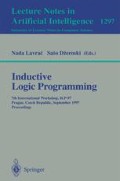Abstract
We investigate how abduction and induction can be integrated into a common learning framework through the notion of Abductive Concept Learning (ACL). ACL is an extension of Inductive Logic Programming (ILP) to the case in which both the background and the target theory are abductive logic programs and where an abductive notion of entailment is used as the coverage relation. In this framework, it is then possible to learn with incomplete information about the examples by exploiting the hypothetical reasoning of abduction. The paper presents the basic framework of ACL with its main characteristics. An algorithm for an intermediate version of ACL is developed by suitably extending the top-down ILP method and integrating this with an abductive proof procedure for Abductive Logic Programming (ALP). A prototype system has been developed and applied to learning problems with incomplete information.
Preview
Unable to display preview. Download preview PDF.
References
H. Ade and M. Denecker. RUTH: An ILP theory revision system. In Proceedings of the 8th International Symposium on Methodologies for Intelligent Systems, 1994.
H. Adé and M. Denecker. AILP: Abductive inductive logic programming. In Proceedings of the 14th International Joint Conference on Artificial Intelligence, 1995.
M. Denecker, L. De Raedt, P. Flach, and A. Kakas, editors. Proceedings of ECAI96 Workshop on Abductive and Inductive Reasoning. Catholic University of Leuven, 1996.
Y. Dimopoulos, S. Džeroski, and A.C. Kakas. Integrating explanatory and descriptive learning in ILP. In Proceedings of the 15th International Joint Conference on Artificial Intelligence, 1997.
Y. Dimopoulos and A. Kakas. Abduction and inductive learning. In L. De Raedt, editor, Advances in Inductive Logic Programming, pages 144–171. IOS Press, 1996.
F. Esposito, E. Lamma, D. Malerba, P. Mello,M. Milano, F. Riguzzi, and G. Semeraro. Learning abductive logic programs. In Denecker et al. [3].
N. Inuzuka, M. Kamo, N. Ishii, H. Seki, and H. Itoh. Top-down induction of logic programs from incomplete samples. In S. Muggleton, editor, Proceedings of the 6th International Workshop on Inductive Logic Programming, pages 119–136. Stockholm University, Royal Institute of Technology, 1996.
A.C. Kakas, R.A. Kowalski, and F. Toni. Abductive logic programming. Journal of Logic and Computation, 2:719–770, 1993.
A.C. Kakas and P. Mancarella. On the relation between truth maintenance and abduction. In Proceedings of the 2nd Pacific Rim International Conference on Artificial Intelligence, 1990.
A.C. Kakas and F. Riguzzi. Learning with abduction. Technical Report TR-96-15, University of Cyprus, Computer Science Department, 1996.
N. Lavrač and S. Džeroski. Inductive Logic Programming: Techniques and Applications. Ellis Horwood, 1994.
L. De Raedt and M. Bruynooghe. A theory of clausal discovery. In Proceedings of the 13th International Joint Conference on Artificial Intelligence, 1993.
L. De Raedt and L. Dehaspe.Learning from satisfiability.Technical report, Katholieke Universiteit Leuven, 1996.
L. De Raedt and W. Van Lear. Inductive constraint logic. In Proceedings of the 5th International Workshop on Algorithmic Learning Theory, 1995.
C. Thompson and R. Mooney. Inductive learning for abductive diagnosis. In Proceedings of the 12th National Conference on Artificial Intelligence, 1994.
S. Wroble and S. Džeroski. The ILP description learning problem: Towards a genearl model-leve definition of data mining in ILP. In Proceedings of the Fachgruppentreffen Maschinelles Lernen, 1995.
Author information
Authors and Affiliations
Editor information
Rights and permissions
Copyright information
© 1997 Springer-Verlag Berlin Heidelberg
About this paper
Cite this paper
Kakas, A.C., Riguzzi, F. (1997). Learning with abduction. In: Lavrač, N., Džeroski, S. (eds) Inductive Logic Programming. ILP 1997. Lecture Notes in Computer Science, vol 1297. Springer, Berlin, Heidelberg. https://doi.org/10.1007/3540635149_47
Download citation
DOI: https://doi.org/10.1007/3540635149_47
Published:
Publisher Name: Springer, Berlin, Heidelberg
Print ISBN: 978-3-540-63514-7
Online ISBN: 978-3-540-69587-5
eBook Packages: Springer Book Archive

